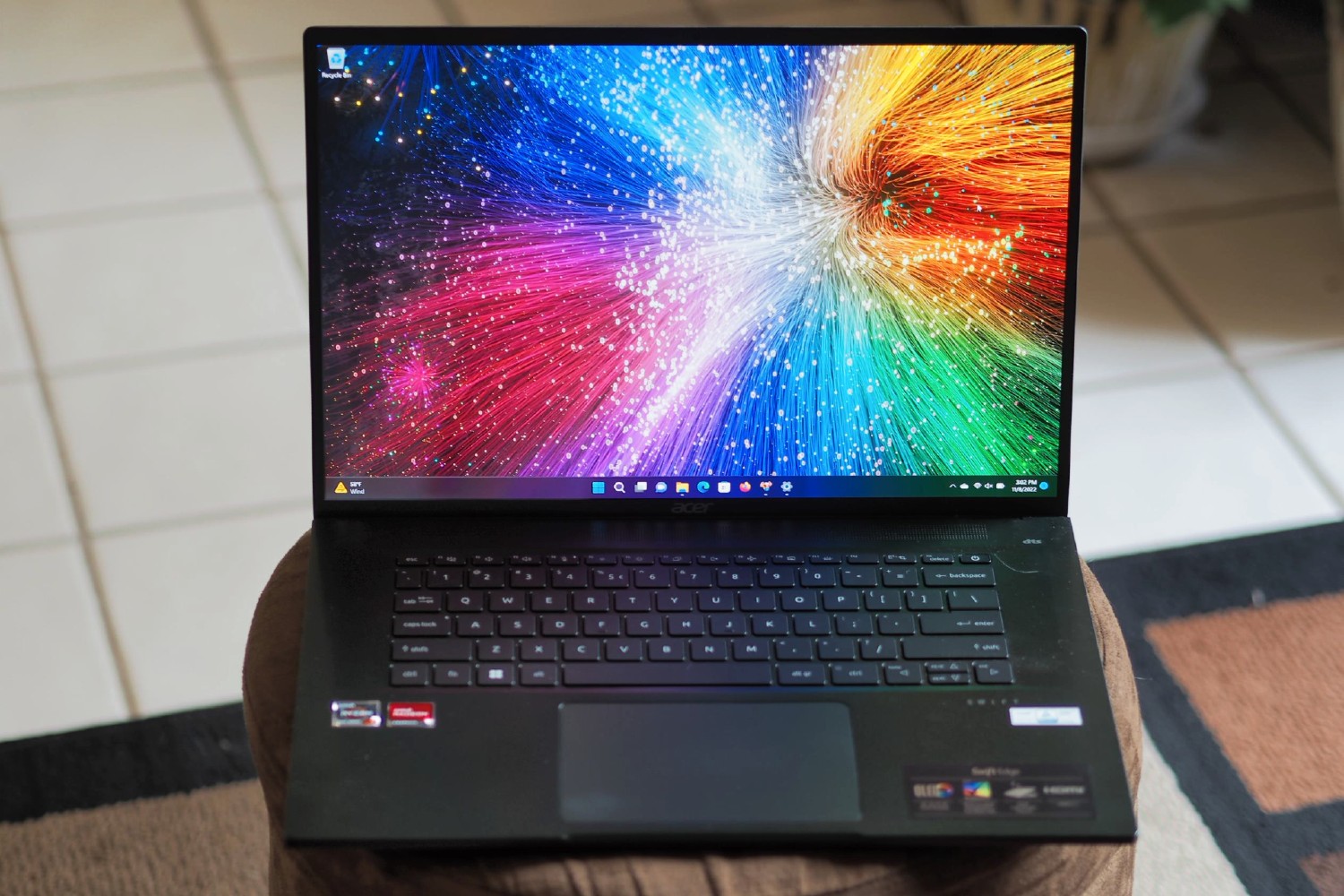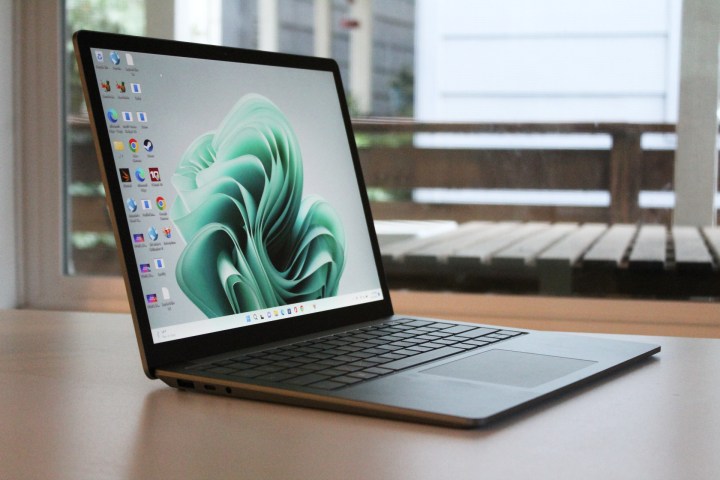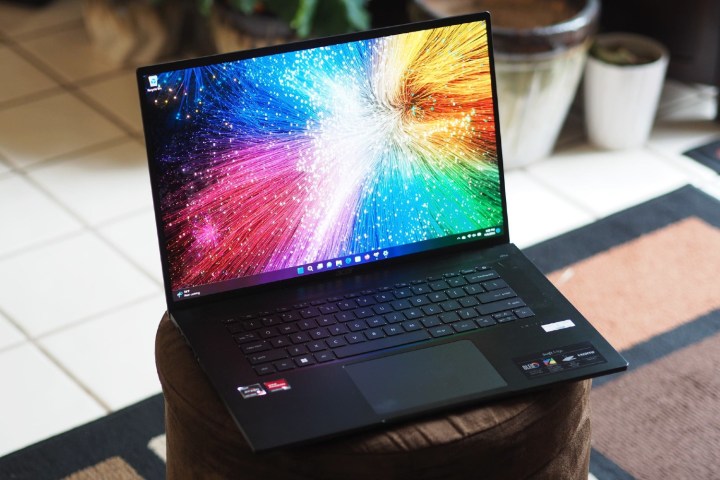Microsoft’s 15-inch Surface Laptop, currently in its fifth generation, has been on our list of the thinnest laptops representing the 15-inch class. There’s a new laptop in town, though — the Acer Swift Edge, which challenges Microsoft’s machine in thinness while being incredibly light as well.
There’s more to just being thin and light, though. Things like performance, durability, and display quality also matter. Does the Swift Edge have what it takes to dethrone the Surface Laptop 5? Read on to find out.
Specs and configurations
| Acer Swift Edge | Microsoft Surface Laptop 5 | |
| Dimensions | 14.04 inches x 9.54 inches x 0.51 inches | 13.4 inches x 9.6 inches x 0.58 inches |
| Weight | 2.58 pounds | 3.44 pounds |
| Processor | AMD Ryzen 7 6800U | Intel Core i7-1255U |
| Graphics | AMD Radeon Graphics | Intel Iris Xe |
| RAM | 16GB LPDDR5 | 8GB LPDDR5x 16GB LPDDR5x 32GB LPDDR5x |
| Display | 16-inch UHD+ (3840 x 2400) OLED | 15-inch 3:2 2496 x 1664 IPS |
| Storage | 1TB PCIe SSD | 256GB PCIe SSD 512GB PCIe SSD 1TB PCIe SSD |
| Touch | No | Yes |
| Ports | 2 x USB-C 3.2 Gen 2 2 x USB-A 3.2 Gen 2 1 x HDMI 2.1 1 x 3.5mm audio jack |
1 x USB-C with Thunderbolt 4 1 x USB-A 3.1 1 x 3.5mm audio jack 1 x Surface Connect port |
| Wireless | Wi-Fi 6E and Bluetooth 5.2 | Wi-Fi 6 and Bluetooth 5.1 |
| Webcam | 1080p with IR camera for Windows 11 Hello | 720p with IR camera for Windows 11 Hello |
| Operating system | Windows 11 | Windows 11 |
| Battery | 54 watt-hours | 47.4 watt-hours |
| Price | $1,500 | $1,300+ |
| Rating | 3.5 out of 5 stars | 3 out of 5 stars |
There’s just one configuration of the Swift Edge, which costs $1,500 for an AMD Ryzen 7 6800U CPU, 16GB of RAM, a 1TB solid-state drive (SSD), and a 16.0-inch 16:10 UHD+ OLED non-touch display. That’s a premium price, but the components are top-notch.
The Surface Laptop 5 starts out less expensive, at $1,300 (on sale for $1,100) for a Core i7-1255U CPU, 8GB of RAM, a 256GB SSD, and a 15.0-inch 3:2 2,496 x 1,664 IPS touch display. But the machine gets a lot more expensive, ramping up to $2,400 (on sale for $2,100) for a Core i7, 32GB of RAM, and a 1TB SSD. That makes it considerably more expensive than the Swift Edge.
Design
- 1.
Microsoft Surface Laptop 5 - 2.
Acer Swift Edge
The Surface Laptop 5 has a distinct look, primarily provided by the very tall 3:2 display with uniform bezels all around. The line and angles are simple but sleek, and it’s an attractive laptop all around. Those larger bezels make it seem less modern, though, something the Swift Edge avoids. It has much smaller bezels around its 16:10 panel, and mated with its sleek, minimalist design, the Swift Edge seems like the more modern machine.
The Swift Edge is constructed of magnesium-aluminum alloy, and as such, has a slightly more flexible chassis than the all-aluminum Surface Laptop 5. The Swift Edge’s display is bendable, and its keyboard deck flexes, making it seem less robust than Microsoft’s laptop. It’s not surprising that the Surface Laptop 5 feels rigid, given that this is a hallmark of the Surface lineup. Both hinges allow opening the lid with one hand and are stable once upright, so no complaints there with either laptop.
Both laptops have competent keyboards with good key spacing and switches that are light and snappy. The Surface Laptop 5’s keyboard is a bit snappier, giving it a superior feel. The mechanical touchpads on both machines are fine.
In terms of connectivity, the Swift Edge has more ports but lacks Thunderbolt 4 support. Its wireless connectivity is more up-to-date, though.
Finally, the Surface Laptop 5 still equips a 720p webcam, behind the Swift Edge’s 1080p version. Both have infrared cameras for Windows 11 Hello login via facial recognition, and the Swift Edge also offers a fingerprint reader.
Performance

The Swift Edge is built around the 28-watt 8-core/16-thread AMD Ryzen 7 6800U CPU. That’s a fast chip for CPU-intensive multithreaded apps, and unsurprisingly, it was faster than the 15-watt Intel Core i7-1255U in the Surface Laptop 5, a 10-core, 12-thread processor.
While Acer’s thermal utility was counterproductive, making the laptop slower in performance mode than in normal mode, it still beat the Surface Laptop in all but Geekbench 5. Both laptops are fast productivity machines, but the Swift Edge is faster.
| Acer Swift Edge (Ryzen 7 6800U) |
Microsoft Surface Laptop 5 (Core i7-1255U) |
|
| Geekbench 5 (single / multi) |
Bal: 1,456 / 7,085 Perf: 1,457 / 6,708 |
Bal: 1,209 / 6,391 Perf: 1,666 / 7,863 |
| Handbrake (seconds) |
Bal: 115 Perf: 154 |
Bal: 139 Perf: N/A |
| Cinebench R23 (single / multi) |
Bal: 1,466 / 8,543 Perf: 1,315 / 5,487 |
Bal: 1,130 / 7,170 Perf: N/A |
Display
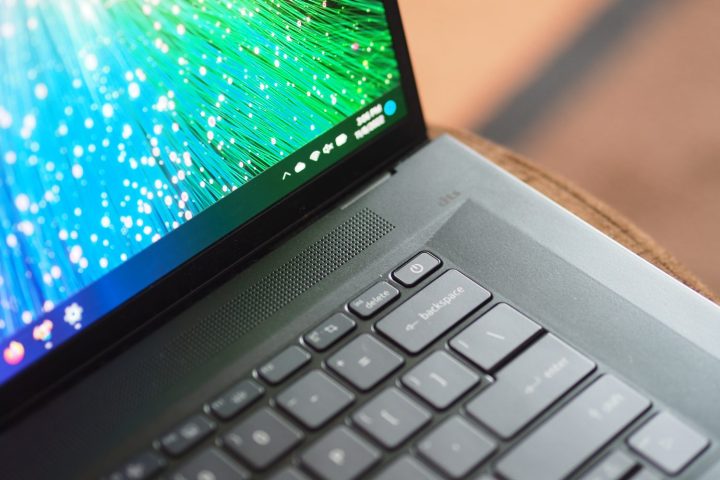
The Swift Edge comes with one display option, a 16.0-inch 16:10 4K+ OLED panel that provides plenty of brightness, extremely wide colors, and the deep contrast and inky blacks common to OLED displays. The Surface Laptop 5’s 3:2 15.0-inch IPS display is lower resolution, has much narrower colors, and its contrast is less than the 1,000:1 ratio we like to see in premium displays. Both displays had colors that were accurate but not class-leading.
There’s no doubt that the Swift Edge’s display is superior for all kinds of work, be it productivity, creativity, or media consumption. The Surface Laptop 5, meanwhile, has a display that’s just barely good enough to be considered premium.
| Acer Swift Edge (OLED) |
Microsoft Surface Laptop 5 (IPS) |
|
| Brightness (nits) |
382 | 375 |
| AdobeRGB gamut | 100% | 73% |
| sRGB gamut | 97% | 96% |
| Accuracy (DeltaE, lower is better) |
1.44 | 1.44 |
| Contrast ratio | 23,590:1 | 970:1 |
Portability
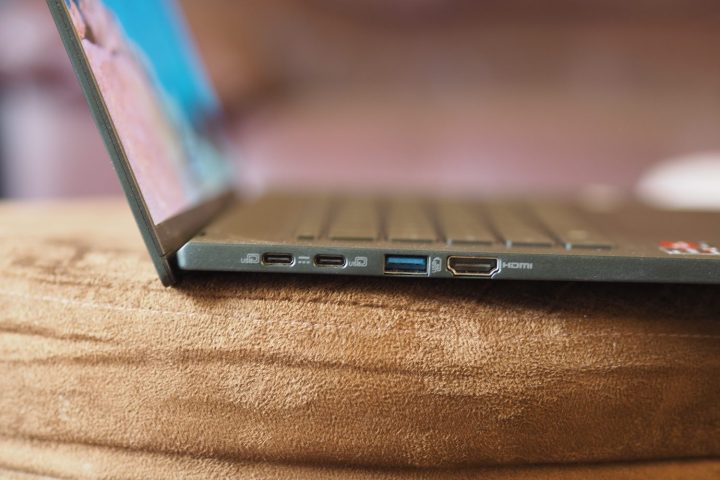
The Swift Edge’s main claim to fame is its incredibly thin and light chassis. It comes in at 0.51 inches thick, less than the Surface Laptop 5’s also remarkably thin 0.58 inches, and it’s just 2.58 pounds compared to 3.44 pounds. Those are shockingly small numbers for a laptop with strong performance and a gorgeous 16-inch OLED display. Neither laptop is overly large for a 15-inch machine, but the Swift Edge has a distinct advantage.
Both laptops saw similar battery life with close to the same battery capacity. That’s a win for the Swift Edge, given that it uses a larger, power-hungry OLED display.
The Swift Edge takes over the thin-and-light large-laptop mantle
The Surface Laptop 5’s primary benefit has been its thin and relatively light chassis, and that’s exactly where the Swift Edge shines. It’s even thinner and a pound lighter, making for a truly portable 16-inch laptop with a gorgeous OLED display.
The Swift Edge will be taking its place on our list of thinnest laptops, and it wins this shootout comfortably.
Editors’ Recommendations
